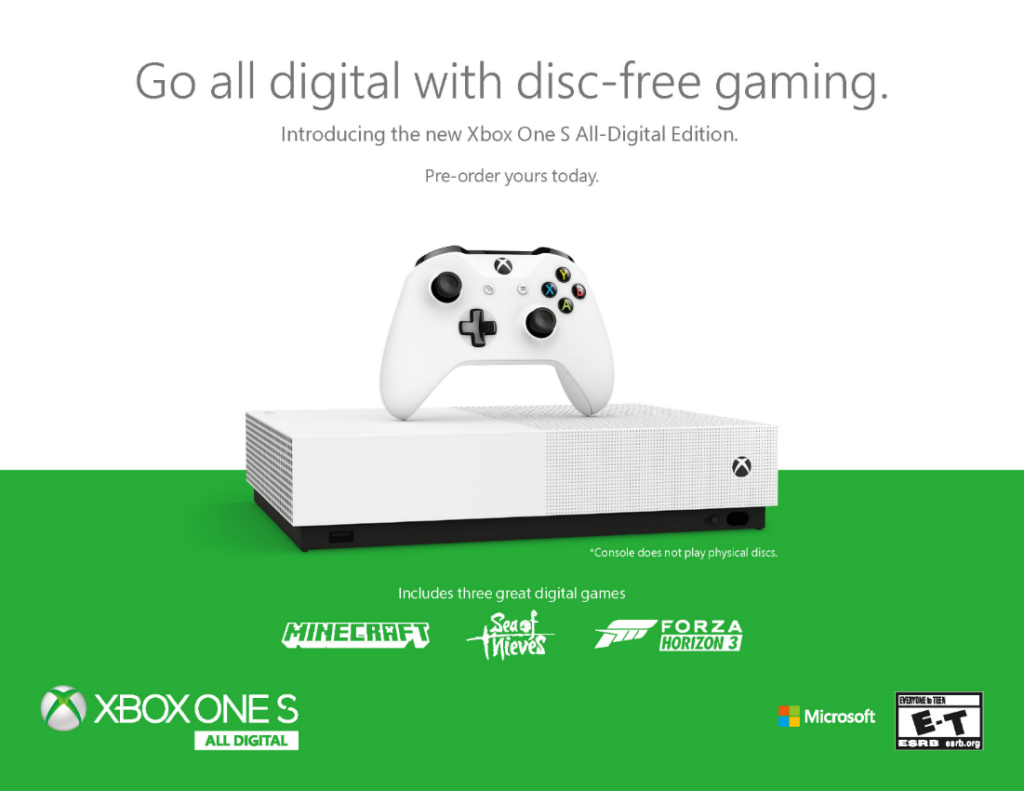
Past is prologue, and two new announcements from Microsoft hint at the future of its Xbox platform.
Yesterday during Microsoft’s Nintendo Direct-style Inside Xbox, the company confirmed rumors that have been floating for a number of weeks. The biggest is that the first “disc-less” Xbox console will be coming on May 7.
Named the Xbox One S All Digital Edition, the 1TB bundle includes Minecraft, Sea of Thieves, and Forza Horizon 3. The new offering pairs well with Microsoft’s subscription programs (Xbox Live Gold and Xbox Game Pass), though those are separate purchases.
The Xbox One S All Digital will release on May 7 for $249.99. Currently, you can purchase an Xbox One S with a disc drive for that same price at a number of retailers bundled with one of a number of major third-party releases, including Battlefield V, Anthem, The Division 2, NBA 2K19, or Fortnite (with 2,000 V-Bucks, about a $20 value).
Given that the real value of an Xbox One S All Digital console comes from also subscribing to Xbox Game Pass, the value of the packed in games is diminished since all Microsoft first-party games are available via the service indefinitely. As of publication, the monetary outlay for the physical-enabled and All Digital consoles is exactly the same. The difference here is individual consumer value perception of the packed-in games and the importance of having a console that can access physical media.
This is further compounded by a Google offer that popped up today with an Xbox One X, Microsoft’s top-of-the-line Xbox One console, bundled with NBA 2K19 for under $300. Microsoft announced the Xbox One S All Digital Edition into a pricing structure that doesn’t convey much value for giving up the disc drive. The company considers $299 the retail price of the Xbox One S and “expect[s] to maintain at least that price difference between the two consoles going forward.” The retail price isn’t as important as cost to consumers, though.
To announce the Xbox One S All Digital Edition, Microsoft released a humorous advertisement called “The Digital Age.” This gives a glimpse into (at least part) of Xbox boss Phil Spencer’s thinking as we head into the next generation.
Rumors have been circulating since November 2018 that the next generation of Xbox consoles may include an all-digital model out of the gate. Microsoft attempted to push consumers into a digital ecosystem with the Xbox One, but its E3 2013 press conference and follow-up messaging were such a disaster that the company abandoned its plans. With the growth of digital adoption during this generation, powered in large part by day-and-date releases and frequent digital sales (something almost entirely absent last generation on consoles), fortunes might favor Microsoft in a way they didn’t six years ago.
The timing of Sony’s interview with Wired in which lead system architect Mark Cerny made a point confirming the next PlayStation’s physical media capabilities now seems exceptionally convenient. Cerny also revealed that Sony’s upcoming hardware will include a load time-busting SSD. According to rumors, the next Xbox may include that feature, as well.
Microsoft also kicked off a unified option for those that subscribe to both Xbox Live Gold and Xbox Game Pass. The Xbox Game Pass Ultimate subscription will cost consumers $15 per month ($180 per year). Currently, Game Pass by itself costs $9.99 per month (approximately $120 per year). Xbox Live is $9.99 month-to-month (approximately $120 per year), but drops as low as $5 per month for those that opt for a $59.99 12-month subscription. For monthly payers, Ultimate ends up costing $5 less per month. There is no savings for consumers that currently opt for the full-year Xbox Live subscription.
Yesterday’s Inside Xbox also brought updates to the Xbox One’s backward compatibility library. Ninja Gaiden II has been added to the roster with Xbox One X upgrades. Additionally, five games already part of the program have been given a new coat of Xbox One X paint: Fable II, Fable III, Splinter Cell Blacklist, Splinter Cell Conviction, and Splinter Cell Double Agent.
As Microsoft winds down the Xbox One era, it appears to be setting the table for what comes next. Game Pass is changing how consumers view game ownership (much as Netflix did for movies and television). The xCloud streaming service appears positioned to compete with Google’s recently announced Stadia platform. And an all-digital console could be the push Microsoft needs to finally achieve what it so desperately wanted consumers to adopt six years ago.
 GameDaily.biz © 2026 | All Rights Reserved.
GameDaily.biz © 2026 | All Rights Reserved.